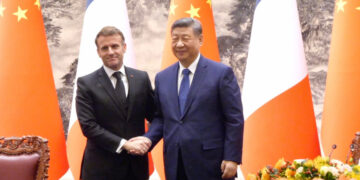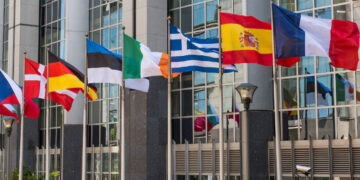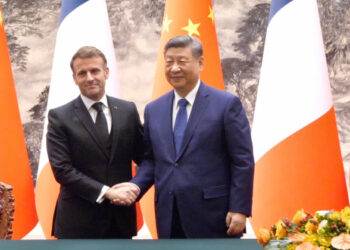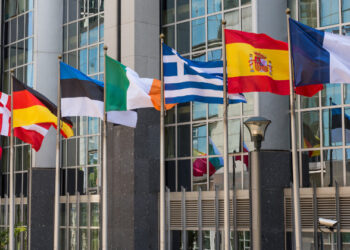Russia’s invasion of Ukraine created a dilemma for European radical right parties that had cultivated friendly ties with Vladimir Putin. Chendi Wang and Argyrios Altiparmakis analyse a decade of Facebook posts to reveal how these parties strategically managed their communications to avoid the political fallout while maintaining their Eurosceptic agenda.
When Russia launched its full-scale invasion of Ukraine in February 2022, European radical right parties that had previously enjoyed cordial relations with Putin’s regime faced an awkward predicament. Some had accepted loans from Russian banks, while others had made official visits to Moscow or publicly praised Putin’s leadership style. Marine Le Pen, for instance, was forced to withdraw electoral leaflets featuring her alongside Putin as French public opinion rapidly turned against Russia.
Our research tracked the social media communication of eleven European radical right parties over a decade (2013-2023) to understand how they navigated this sudden shift. We analysed nearly 370,000 Facebook posts from parties including France’s National Rally, Italy’s Lega, Germany’s AfD, Hungary’s Fidesz and Poland’s Confederation, focusing specifically on how they addressed Russia and the war.
Figure 1: Salience and stance towards Russia and EU from 2013 to 2023
Note: For more information, see the authors’ accompanying paper in European Union Politics.
Rather than maintaining their pro-Russia stance or completely reversing their position, most radical right parties employed strategic ambiguity when discussing the war. The overwhelming majority neither defended Putin’s actions nor focused on denouncing Russia, instead employing three key communication strategies.
First, they adopted “strategic silence”. Many parties significantly reduced their mentions of Russia after the invasion, with some like Spain’s Vox barely addressing the conflict at all. Second, they used “topic switching”. When discussing the war, parties frequently redirected attention to issues like energy prices, inflation and the refugee crisis – framing these as consequences of EU policies rather than Russian aggression. Finally, they “blurred their position”. Parties often took ambiguous stances, acknowledging the invasion was regrettable while questioning sanctions, arms shipments or other western responses.
Our quantitative analysis confirms these qualitative observations: while sentiment toward Russia did decline slightly after the invasion, the drop was relatively modest. More tellingly, posts that mentioned Russia became increasingly negative toward the EU, revealing how these parties weaponised the crisis to reinforce their Eurosceptic positions.
Different parties, different approaches
While these overall patterns emerged across the radical right landscape, we observed important variations in how individual parties navigated the crisis. In Eastern Europe, the Czech and Polish radical right parties (SPD and Confederation) were the least apologetic, focusing on the immediate aftermath of the invasion, framing negatively the influx of Ukrainian refugees and taking the opportunity to separate their position from the staunchly anti-Russian mainstream stance.
Figure 2: Sentiment towards Russia and the EU by party and period

Note: For more information, see the authors’ accompanying paper in European Union Politics.
In Germany and Italy, where Russian gas lines were critical to industrial and energy infrastructure, the AfD and Lega initially condemned Russia, but quickly shifted their attention to the futility of energy sanctions and the disproportionate damage caused to their domestic economies.
Finally, the more geographically distant French, Dutch and Belgian radical right parties offered stronger initial condemnations, but focused gradually less on the war, advocating in general for peace. Instead, they highlighted the juxtaposition between the “good” Ukrainian immigrants, of which their countries did not receive a vast quantity, and the “undeserving” migrants from elsewhere.
A war of words about the EU
Perhaps most significantly, our research revealed that radical right parties strategically used the Ukraine crisis to reinforce their Eurosceptic credentials. Our analysis shows a 6 percent increase in negative sentiment toward the EU when these parties discussed Russia after the invasion.
Figure 3: Determinants of sentiment towards the EU

Note: For more information, see the authors’ accompanying paper in European Union Politics.
Rather than blaming Russia for energy price spikes or other economic hardships, these parties consistently framed such problems as EU policy failures. They argued that European governments had made countries vulnerable through naïve energy policies, excessive reliance on Russian gas or ineffective sanctions that harmed their own citizens more than Russia.
As one Italian Lega post put it, the EU’s sanctions were “in reality harmful to the Italian people mostly”, while failing to curtail Russian aggression. Similar narratives appeared across parties, using the war as evidence of EU incompetence rather than Russian wrongdoing.
Implications for European politics
The radical right’s strategic navigation of the Ukraine crisis offers several insights into contemporary European politics. First, it demonstrates these parties’ sophisticated communication strategies in managing potentially damaging positions. Rather than outright reversals or stubborn adherence to pro-Russia stances, they employed nuanced rhetorical techniques to shift focus from their previous positions.
Second, the consistent integration of Ukraine-related topics into anti-EU narratives shows how external crises can be repurposed to reinforce core ideological positions. While public opinion strongly supported Ukraine, radical right parties found ways to channel crisis discourse into criticism of European institutions.
Finally, this case illustrates the increasing professionalisation of radical right parties, which now operate as strategic political actors rather than merely protest movements. Their ability to rapidly calibrate messaging on complex geopolitical issues reflects their evolution into sophisticated political operators.
This communication pattern appears to have paid electoral dividends. Despite their previous associations with Putin’s regime, these parties have suffered minimal electoral consequences from their Russia ties. By successfully shifting the conversation from their potentially problematic past positions to popular concerns about energy prices and inflation, they managed to avoid significant political fallout while maintaining their distinctive ideological profile.
For more information, see the authors’ accompanying paper in European Union Politics.
Note: This article gives the views of the authors, not the position of EUROPP – European Politics and Policy or the London School of Economics. Featured image credit: David Renz / Shutterstock.com












































Discussion about this post